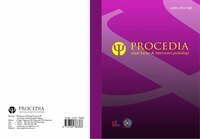Terapi kognitif perilaku untuk mengurangi gejala kecemasan
DOI:
https://doi.org/10.22219/procedia.v10i2.19215Keywords:
Anxiety, cognitive behavioral therapy , cognitive restructuring, relaxationAbstract
Anxiety is a psychological disorder that can interfere with daily activities. Individuals who experience anxiety will develop cognitive distortions and maladaptive behavior. In general, anxiety is characterized by feelings of irritability, restlessness, difficulty sleeping, difficulty concentrating, and heart palpitations. The purpose of this study was to see whether Cognitive Behavioral Therapy could reduce anxiety symptoms. The subject is one person, female and 26 years old. The assessment methods used are clinical interviews, observation, graphic tests, thematic perception tests, Beck Anxiety Inventory, self-report, WHODAS 2.0, and Mental Status Exam. The therapy used to overcome social anxiety is Cognitive Behavioral Therapy with cognitive restructuring techniques and deep breathing relaxation techniques. Cognitive restructuring aims to replace negative thoughts with positive ones; while the relaxation technique aims to make the subject have the skills to control anxiety. The results of the therapy show that cognitive behavioral therapy can reduce anxiety symptoms.
Downloads
References
Anila, A., Iqbal, M. N., & Mohsin, A. (2014). The moderating role of positive and negative emotions in relationship between positive psychological capital and subjective well-being among adolescents. International Journal of Research Studies in Psychology, 3(3). https://doi.org/10.5861/ijrsp.2014.687
Asvaroglu, S. Y., & Bekirogullari, Z. (2020). Cognitive behavioural therapy treatment for child anger management. The European Journal of Social & Behavioural Sciences, 28(2), 112–118. https://doi.org/10.15405/ejsbs.274
Beck, A. T., & Haigh, E. A. P. (2014). Advances in cognitive theory and therapy: the generic cognitive model. Annual Review of Clinical Psychology, 10(2), 1–24. https://doi.org/10.1146/annurev-clinpsy-032813-153734
Brahmbhatt, A., Richardson, L., & Prajapati, S. (2021). Identifying and managing anxiety disorders in primary care. Journal for Nurse Practitioners, 17(1), 18–25. https://doi.org/10.1016/j.nurpra.2020.10.019
Carpenter, JK, Andrews, LA, Witcraft, SM, Powers, MB, Smits, JAJ, Hofmann, SG.(2016). Cognitive behavioral therapy for anxiety and related disorders: a meta-analysis of randomized placebo-controlled trials. Physiology & Behavior, 35(6), 100–106. https://doi.org/10.1002/da.22728.Cognitive
Chapdelaine, A., Carrier, J. D., Fournier, L., Duhoux, A., & Roberge, P. (2018). Treatment adequacy for social anxiety disorder in primary care patients. PLoS ONE, 13(11), 1–15. https://doi.org/10.1371/journal.pone.0206357
Churchil, D., E, Lk., & Lippman, L. (2016). Early childhood social and emotional development: advancing the field of measurement. Journal of Applied Developmental Psychology, 45, 1–7. https://doi.org/10.1016/j.appdev.2016.02.002
Clark, D. . (2013). Cognitive restructuring. The Wiley Handbook of Cognitive Behavioral, 1–22. https://doi.org/10.1002/9781118528563
Eridani, D., Aditya, M., Rifki, M., & Isnanto, R. R. (2018). Sistem pakar pendiagnosis gangguan kecemasan menggunakan metode forward chaining berbasis android. Edu Komputika Journal, 5(1), 62–68. https://doi.org/10.15294/edukomputika
Fleming, T., Dixon, R., Frampton, C., & Merry, S. (2012). A pragmatic randomized controlled trial of computerized cbt (sparx) for symptoms of depression among adolescents excluded from mainstream education article. Behavioural and Cognitive Psychotherapy, 40(5), 529–541. https://doi.org/10.1017/S1352465811000695
Hirsch, C. R., Beale, S., Grey, N., & Liness, S. (2019). Approaching cognitive behavior therapy for generalized anxiety disorder from a cognitive process perspective. Frontiers in Psychiatry, 10(11). https://doi.org/10.3389/fpsyt.2019.00796
Hofmann, S. G., Asnaani, A., Vonk, I. J. J., Sawyer, A. T., & Fang, A. (2012). The efficacy of CBT: a review of meta-analyses. Cognitive Therapy Research, 36(5), 427–440. https://doi.org/10.1007/s10608-012-9476-1
Kaczkurkin, A. N., & Foa, E. B. (2015). Cognitive-behavioral therapy for anxiety disorders: an update on the empirical evidence. Dialogues in Clinical Neuroscience, 17(3), 337–346. https://doi.org/10.31887/dcns.2015.17.3/akaczkurkin
Otte, C. (2011). Cognitive behavioral therapy in anxiety disorders: current state of the evidence. Dialogues in Clinical Neuroscience, 13(4), 413–421. https://doi.org/10.31887/dcns.2011.13.4/cotte
Rahmadiani, N. D. (2020). Cognitive behavior therapy dalam menangani kecemasan sosial pada remaja. Procedia : Studi Kasus Dan Intervensi Psikologi, 4(1), 10–18. https://doi.org/10.22219/procedia.v4i1.11961
Roberge, P., Normand-Lauzière, F., Raymond, I., Luc, M., Tanguay-Bernard, M. M., Duhoux, A., Bocti, C., & Fournier, L. (2015). Generalized anxiety disorder in primary care: mental health services use and treatment adequacy. BMC Family Practice, 16(1), 19–21. https://doi.org/10.1186/s12875-015-0358-y
Rosner, R. I. (2014). The “Splendid Isolation” of Aaron T. Beck. The History of Science Society, 105(4), 734–758. https://doi.org/10.1086/679421
Supriatna, E., Septian, M. R., & Alawiyah, T. (2021). Aspects of the psychological well-being of muslim students in bandung from the perspective of islamic psychology during the covid-19 pandemic. Ilmu Dakwah: Academic Journal for Homiletic Studies, 15(1), 149–168. https://doi.org/10.15575/idajhs.v15i1.11064
Downloads
Published
How to Cite
Issue
Section
License
Copyright (c) 2022 Muhammad Haikal

This work is licensed under a Creative Commons Attribution-NonCommercial 4.0 International License.






